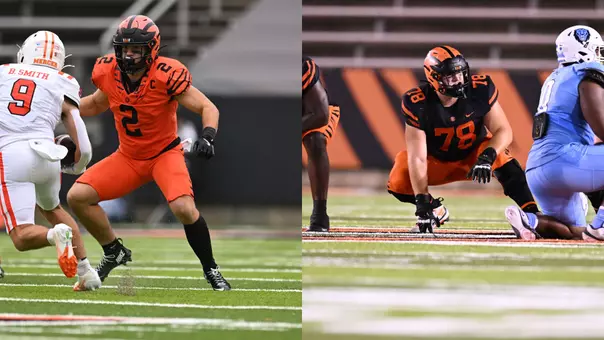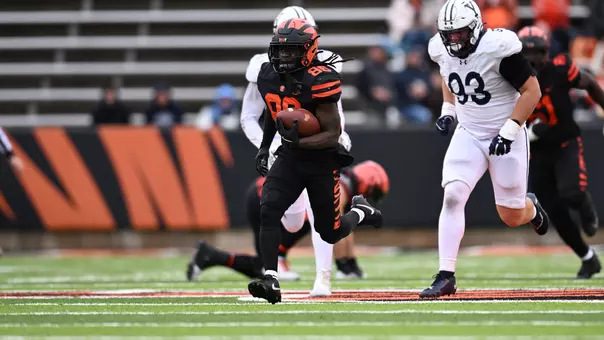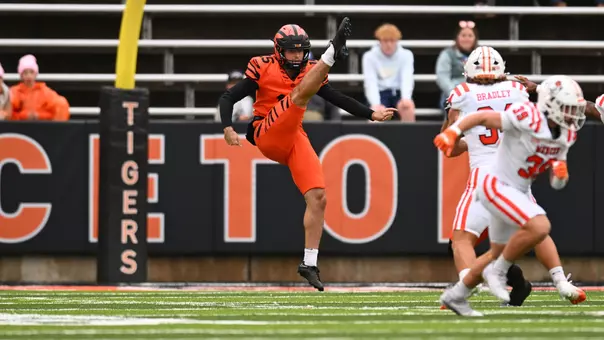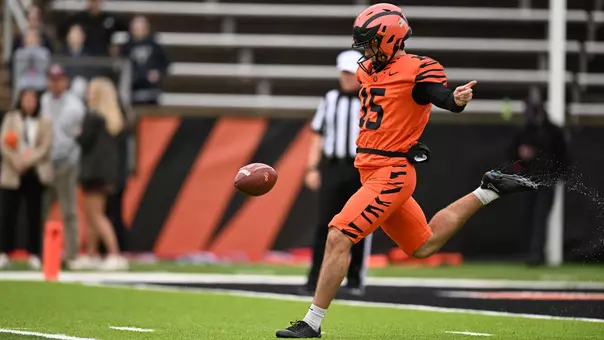Princeton University Athletics
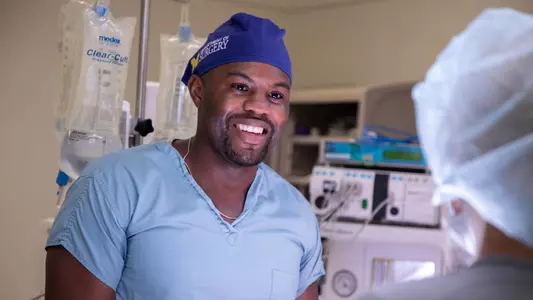
Photo by: Beverly Schaefer
Feature Story - Dr. Glenn Wakam, Tiger Football Alum, Is Making A Difference In The COVID-19 Fight
May 11, 2020 | Football
Glenn Wakam's piece in the New England Journal Of Medicine
Glenn Wakam On Princeton's "We Roar" Podcast
Glenn Wakam is smiling in the picture. Widely. He is dressed in blue surgical scrubs, with "Department of Surgery" written on the side of his cap.
He looks like he doesn't have a care in the world, as befitting someone who grew up in Southern California. In fact, he looks so relaxed – so Hollywood – that he could possibly be an actor, dressed like a doctor, between takes on a set.
The drama in which he finds himself these days, though, is hardly theatrical. It's very much real life, actually life and death, and he's actually found himself cast in a much more leading role than he might have ever imagined.
"These last few months," he says with a slight chuckle, "have been different than anything I've been through."
As the Coronavirus has swept through the world, Glenn Wakam has found himself center stage in the drama, from the ICUs of the very hospitals he thought not long ago would be a good way to earn some extra money during his surgical residency. His perspective has furthered his education in ways he never imagined, reminded him of the lessons he learned playing football at Princeton, made him think critically about larger societal issues and even thrust him into the national spotlight.
"Glenn is an incredible person," says Princeton head coach Bob Surace. "What he's doing is amazing, and he's a perfect example of the kind of person we love to say is Princeton football alum."
Not that long ago, Wakam was a typical surgical resident, in Year 4 of a seven-year program that would take him to his ultimate goal of being a transplant surgeon. Wakam, who is doing his residency in the Detroit area, did what many residents will do.
"My Monday to Friday was taken up since July working on traumatic brain injury," he says. "To make some extra money, I was working on nights and weekends in the ICU at community hospitals around Detroit, just taking care of some patients."
Then the COVID-19 crisis hit. And everything changed for him in an instant.
"Almost overnight, Detroit was overrun with patients," he says. "What was supposed to be an easy side job became really advanced, really quickly, with really sick patients. The last few months, I've grown so much as a physician. It's been quite an education."
That's saying a lot, considering his educational background was already pretty intense.
Wakam is the son of immigrants from Cameroon, and education was clearly important to them. His mother herself is a doctor, and his father's background is as a chemical engineer, while his brother went to Princeton and his sister went to Harvard. The family originally lived outside Detroit before moving to Ventura, in Southern California, when he was in third grade.
He grew up as a top student and athlete at St. Bonaventure High School, and his high school resume included being his school's all-time leading goal scorer in soccer, an all-state selection in soccer and football, a 27-1 record in football his final two years and election as the president of the National Honor Society.
He chose Princeton over Stanford and came to Princeton in 2007, one year after the Tigers won the Ivy League championship. He worked his way up to become a starting cornerback, and he had a huge interception in the fourth quarter of the 2009 Yale game, one that the Tigers won 24-17.
"That Yale game was the highlight of my Princeton career," he says. "It was a really enjoyable moment."
It's not, though, the first thing he thinks of when he thinks of Princeton football.
"My real joy was my teammates," he says. "We've stayed really, really close. When I got married, almost all of my groomsmen were Princeton football players. My daughter's godfather is a Princeton football player. When we talk about being teammates, almost none of it is about the games. It's about the practices. It's about the experience. It's about the nights we hung out. It's about the bond we built."
He graduated in 2011, which meant his senior year was Surace's first as head coach.
"That was a very special group for me," Surace says. "That was my first team at Princeton, and that senior class did a lot to help us lay the foundation for what we've been able to build."
For his part, Wakam had no doubt that the success was going to follow.
"He came in with an unbelievable energy," Wakam says of Surace. "He had very unique leadership, and you could already tell he was recruiting at a very high level. That's what separated him then, and it still does."
Wakam was in medical school at the University of California in San Francisco when Surace won his first Ivy title, in 2013. He was beginning his residency when Princeton won again in 2016, and he was already well-established when the Tigers went 10-0 in 2018.
"I've followed the team every week," Wakam says. "I haven't been able to get back to games, but I definitely follow them. We have some Harvard guys here. It's been nice the last couple of years."
What were his biggest takeaways from being a Princeton football player, other than the relationships he built?
"The two main things I took way from football were first, the work ethic," he says. "I don't think I appreciated it at the time, but when you have the ability to wake up, do conditioning, go to class, go to practice, do homework and everything else, you learn time management in ways that serve you incredibly well. And second, I learned about the ability of being team-oriented. When I talk to people in other fields, they all say life is about being a team player, and former athletes do well because the skills of being a good teammate make you a good coworker. You're used to working super hard for the sake of people other than just yourself. As an athlete, as a football player, that's what you did every day."
It's certainly served him well of late.
"The whole thing is surreal," he says. "It's very scary to deal with it. The patients get really really sick, really really quickly. There has been a lot of death. Even for people who are used to being around it, the rate of death is way faster than anything I've ever seen. And second, it's having a disproportionate effect on communities of color, especially African-American communities. At first I thought it was because we were in Detroit, which has a heavy African-American community, but then as it progressed, I saw that it was way worse in that community than it should have been. There are serious issues. Poverty. Unequal access to health care. Lack of a safety net. I hope these are issues that people pay attention to when there's not a national emergency."
Wakam's front-row seat for this has led him to start to become a leader of the conversation, with interviews and podcasts that he hopes are being heard.
He has also been moved by another part of the issue. As he has seen patients who have died from the virus, he has also felt the pain of family members who haven't been allowed to be with their loved ones as they pass away.
To that end, Wakam and three of his colleagues set out to tell that story as well. The result was a piece entitled "Not Dying Alone – Modern Compassionate Care in the COVID-19 Pandemic." Included is his first-person account of one of his patients who did die alone, while his wife was in the hospital lobby, in the middle of the night, unable to get in.
Their story was picked up by the prestigious New England Journal of Medicine. He also found himself on CNN to discuss all of these issues.
"We really wrote it as a cathartic experience," he says. "We figured it would be rejected by the journal. I think it's a part of the situation that people aren't taking about or thinking about."
His thoughts are on the entire situation, and what comes next.
"This is not being overblown," he says. "It's scary, and it's 100 percent real. I'm not sure if life will go back to being exactly the same. This is such a defining moment in all of our lifetimes. We'll always remember it, and we'll always remember how it changed us and our lives."
It'll also be remembered for the ones who stepped up, however they could.
For some, like Glenn Wakam, that's meant the furtherance of an education in ways he never would have imagined not that long ago.
Glenn Wakam On Princeton's "We Roar" Podcast
Glenn Wakam is smiling in the picture. Widely. He is dressed in blue surgical scrubs, with "Department of Surgery" written on the side of his cap.
He looks like he doesn't have a care in the world, as befitting someone who grew up in Southern California. In fact, he looks so relaxed – so Hollywood – that he could possibly be an actor, dressed like a doctor, between takes on a set.
The drama in which he finds himself these days, though, is hardly theatrical. It's very much real life, actually life and death, and he's actually found himself cast in a much more leading role than he might have ever imagined.
"These last few months," he says with a slight chuckle, "have been different than anything I've been through."
As the Coronavirus has swept through the world, Glenn Wakam has found himself center stage in the drama, from the ICUs of the very hospitals he thought not long ago would be a good way to earn some extra money during his surgical residency. His perspective has furthered his education in ways he never imagined, reminded him of the lessons he learned playing football at Princeton, made him think critically about larger societal issues and even thrust him into the national spotlight.
"Glenn is an incredible person," says Princeton head coach Bob Surace. "What he's doing is amazing, and he's a perfect example of the kind of person we love to say is Princeton football alum."
Not that long ago, Wakam was a typical surgical resident, in Year 4 of a seven-year program that would take him to his ultimate goal of being a transplant surgeon. Wakam, who is doing his residency in the Detroit area, did what many residents will do.
"My Monday to Friday was taken up since July working on traumatic brain injury," he says. "To make some extra money, I was working on nights and weekends in the ICU at community hospitals around Detroit, just taking care of some patients."
Then the COVID-19 crisis hit. And everything changed for him in an instant.
"Almost overnight, Detroit was overrun with patients," he says. "What was supposed to be an easy side job became really advanced, really quickly, with really sick patients. The last few months, I've grown so much as a physician. It's been quite an education."
That's saying a lot, considering his educational background was already pretty intense.
Wakam is the son of immigrants from Cameroon, and education was clearly important to them. His mother herself is a doctor, and his father's background is as a chemical engineer, while his brother went to Princeton and his sister went to Harvard. The family originally lived outside Detroit before moving to Ventura, in Southern California, when he was in third grade.
He grew up as a top student and athlete at St. Bonaventure High School, and his high school resume included being his school's all-time leading goal scorer in soccer, an all-state selection in soccer and football, a 27-1 record in football his final two years and election as the president of the National Honor Society.
He chose Princeton over Stanford and came to Princeton in 2007, one year after the Tigers won the Ivy League championship. He worked his way up to become a starting cornerback, and he had a huge interception in the fourth quarter of the 2009 Yale game, one that the Tigers won 24-17.
"That Yale game was the highlight of my Princeton career," he says. "It was a really enjoyable moment."
It's not, though, the first thing he thinks of when he thinks of Princeton football.
"My real joy was my teammates," he says. "We've stayed really, really close. When I got married, almost all of my groomsmen were Princeton football players. My daughter's godfather is a Princeton football player. When we talk about being teammates, almost none of it is about the games. It's about the practices. It's about the experience. It's about the nights we hung out. It's about the bond we built."
He graduated in 2011, which meant his senior year was Surace's first as head coach.
"That was a very special group for me," Surace says. "That was my first team at Princeton, and that senior class did a lot to help us lay the foundation for what we've been able to build."
For his part, Wakam had no doubt that the success was going to follow.
"He came in with an unbelievable energy," Wakam says of Surace. "He had very unique leadership, and you could already tell he was recruiting at a very high level. That's what separated him then, and it still does."
Wakam was in medical school at the University of California in San Francisco when Surace won his first Ivy title, in 2013. He was beginning his residency when Princeton won again in 2016, and he was already well-established when the Tigers went 10-0 in 2018.
"I've followed the team every week," Wakam says. "I haven't been able to get back to games, but I definitely follow them. We have some Harvard guys here. It's been nice the last couple of years."
What were his biggest takeaways from being a Princeton football player, other than the relationships he built?
"The two main things I took way from football were first, the work ethic," he says. "I don't think I appreciated it at the time, but when you have the ability to wake up, do conditioning, go to class, go to practice, do homework and everything else, you learn time management in ways that serve you incredibly well. And second, I learned about the ability of being team-oriented. When I talk to people in other fields, they all say life is about being a team player, and former athletes do well because the skills of being a good teammate make you a good coworker. You're used to working super hard for the sake of people other than just yourself. As an athlete, as a football player, that's what you did every day."
It's certainly served him well of late.
"The whole thing is surreal," he says. "It's very scary to deal with it. The patients get really really sick, really really quickly. There has been a lot of death. Even for people who are used to being around it, the rate of death is way faster than anything I've ever seen. And second, it's having a disproportionate effect on communities of color, especially African-American communities. At first I thought it was because we were in Detroit, which has a heavy African-American community, but then as it progressed, I saw that it was way worse in that community than it should have been. There are serious issues. Poverty. Unequal access to health care. Lack of a safety net. I hope these are issues that people pay attention to when there's not a national emergency."
Wakam's front-row seat for this has led him to start to become a leader of the conversation, with interviews and podcasts that he hopes are being heard.
He has also been moved by another part of the issue. As he has seen patients who have died from the virus, he has also felt the pain of family members who haven't been allowed to be with their loved ones as they pass away.
To that end, Wakam and three of his colleagues set out to tell that story as well. The result was a piece entitled "Not Dying Alone – Modern Compassionate Care in the COVID-19 Pandemic." Included is his first-person account of one of his patients who did die alone, while his wife was in the hospital lobby, in the middle of the night, unable to get in.
Their story was picked up by the prestigious New England Journal of Medicine. He also found himself on CNN to discuss all of these issues.
"We really wrote it as a cathartic experience," he says. "We figured it would be rejected by the journal. I think it's a part of the situation that people aren't taking about or thinking about."
His thoughts are on the entire situation, and what comes next.
"This is not being overblown," he says. "It's scary, and it's 100 percent real. I'm not sure if life will go back to being exactly the same. This is such a defining moment in all of our lifetimes. We'll always remember it, and we'll always remember how it changed us and our lives."
It'll also be remembered for the ones who stepped up, however they could.
For some, like Glenn Wakam, that's meant the furtherance of an education in ways he never would have imagined not that long ago.
Trench Talk - Episode 5: Jaden Wedderburn
Thursday, November 20
Beyond the Stripes: Torian Roberts
Wednesday, November 19
Trench Talk - Episode 4: London Robinson
Tuesday, October 28
Trench Talk - Episode 3: Joe Harris
Thursday, October 16



.png&width=24&type=webp)


